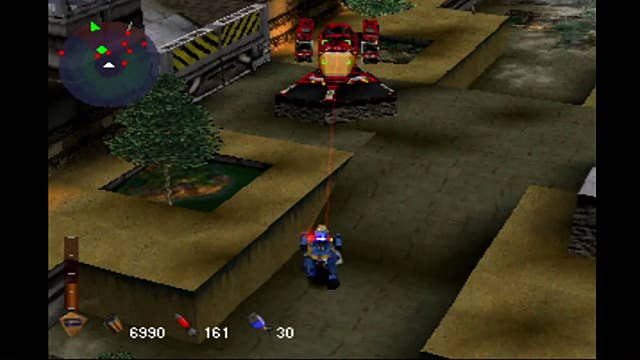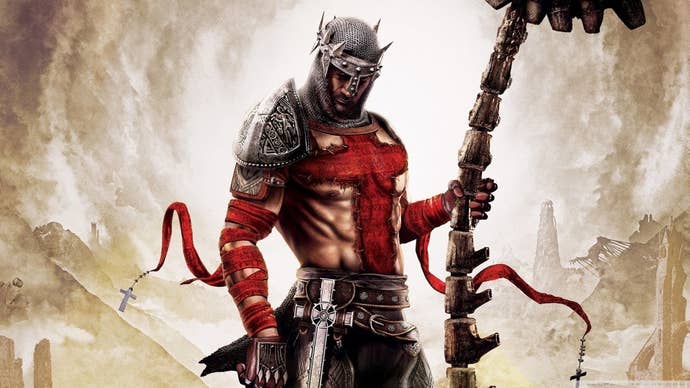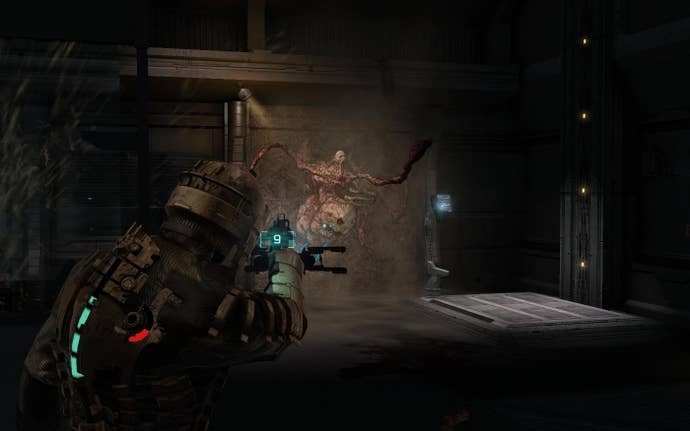The Rise and Fall of Visceral Games
From MOBA-likes before there were MOBAs to changing survival horror forever, we reflect on Visceral Games' legacy.
This article first appeared on USgamer, a partner publication of VG247. Some content, such as this article, has been migrated to VG247 for posterity after USgamer's closure - but it has not been edited or further vetted by the VG247 team.
Long before Multiplayer Online Battle Arenas (MOBAs) were a thing, the 1998 PlayStation strategy game Future Cop L.A.P.D. from Visceral Games—then known as EA Redwood Shores—existed. It ended up being a cult hit because of its Precinct Assault mode, veering similar to what we see today in MOBAs like DOTA. Eventually a mapmaker even created a custom map for StarCraft that was rumored to have been inspired heavily by Future Cop's own Precinct Assault called Aeon of Strife. And well, the rest is history.
But that's just a small sliver of the legacy Visceral Games has left behind after being shuttered on Tuesday by EA. They were one of EA's oldest studios once; game developers first known for their licensed games, a few Sims-related things here and there, and a couple less-than-stellar Battlefields. Their legacy lies most in a well-regarded, original horror series that sparked a whole subgenre to shift: Dead Space.
Dead Space wasn't just a game about the horrors that secretly lie in deep space, but it was an exploration of what those terrors sound like, how they feel, what surviving true horror should be like in space. Dead Space was scary to play through, not just to watch or weather jump scares from. It inspired leagues of other space-bound horror titles, and yet, none ever quite scared players as much as Dead Space did back in 2008.
Let's hop back in time though, before Dead Space paved the future for Visceral Games being, well, Visceral Games.

The Dawn of Visceral Games
EA Redwood Shores, then just a Redwood Shores, California-based label within EA Games, was established in 1998 along with the release of the maybe-eventual MOBA-inspiring Future Cop L.A.P.D.. EA Redwood Shores went on to make other games, from golf experiences starring the now-disgraced Tiger Woods to the licensed hack-and-slash adaptation for The Lord of the Rings: Return of the King (a far cry from this month's Middle-earth: Shadow of War). EA Redwood Shores' titles were by and large the types of games most folks wouldn't pay much notice, except maybe the families buying gifts for loved ones for the holidays.
But then those developers were given a chance to venture outside of run-of-the-mill licensed games and create Dead Space, a game that reinvigorated horror games for a short time after its release. The genre had jumped more into full-blown action territory (thanks Resident Evil 4), losing the horror that made survival horror games special in the first place. Dead Space released long before Amnesia: The Dark Descent later did the same thing—that is, injecting life into the horror genre, inciting a wave of defenseless survival horror games. Dead Space, in many ways, helped save horror.
Describing Dead Space to the average person makes it sound like an Alien knock-off. You're exploring a spaceship, you find out the whole crew has been slaughtered, and you fight their reanimated corpses. What the description doesn't pay mind to is how the game feels to play—that is, truly frightening. Something sorely missed in most horror games of the mid-to-late 2000s. There's a reason Dead Space has stood the test of time, and has even net a famous fan in horror filmmaker John Carpenter.
Dead Space wouldn't exist without Resident Evil 4 though. When Resident Evil 4 released in 2005, it was the push Dead Space designers Ben Wanat and Wright Bagwell needed. "It's pretty obvious when you play Dead Space, to look at it and go, 'Yeah, it's almost like they decided to make Resident Evil 4 in space,' which is exactly what we were doing," Wanat told PC Gamer this year. "It was like, 'It's a game changer. Let's embrace it and make this the best, polished survival shooter. Let's try to be the gold standard.'" Lucky for them, Dead Space (and arguably Dead Space 2 as well) did become the gold standard for horror survival shooters.
After the success of Dead Space, EA Redwood Shores rebranded to a not as obviously-EA tethered identity: Visceral Games, a studio dedicated to creating third-person action games that had an edge to them. The developers went on to make other third-person action games that weren't Dead Space-related, including Dante's Inferno and Army of Two: The Devil's Cartel. But recapturing the magic they had with the Dead Space series proved to be a difficult task.
2010's Dante's Inferno was an adaptation of the classical poem of the same name, the first part of the 14th century epic poem Divine Comedy penned by Italian poet Dante Alighieri. The adaptation made a stark change from the intricately mapped hell that inspired it: instead of Dante being motivated by learning the meaning of sin, he was given a love interest to rescue from Satan. He no longer fainted at every disturbing occurrence—he had a six-pack of abs to glisten with sweat now, and a cross stitched across his chest too.
These all, of course, proved to be controversial changes. Some scholars even argued that rendering the poem's heroine Beatrice as a damsel that needed saving (and not as someone who inspired him to be a better person) was a fundamental misunderstanding of Dante's poem Inferno in the first place. In a story for The Atlantic, Classics Professor Arielle Saiber from Bowdoin College told the reporter, "Beatrice saves Dante, not the other way around!"

Yet, tweaking Inferno was how Visceral brought the poem to modern audiences in a twisted way, even if they took more than a few creative liberties for its interactive experience. "[Dante] fundamentally mapped hell with this poem," the game's executive producer Jonathan Knight told NPR in 2010. "He's created a visual topography, and there's a tremendous amount of structure, geography, weather—and monsters." Inadvertently, Dante laid out the perfect setting for a video game. While it was hoped that Dante's Inferno would inspire players to read the 700-year-old poem and more of Dante's work (including Divine Comedy) too, the game got mixed reviews upon release.
Not all of Visceral Games' projects came to life though. Even before Dante's Inferno's release, whispers arose about a mysterious new Visceral title centered around legendary (and never captured) serial killer Jack the Ripper. The would-be downloadable title for Xbox 360 and PlayStation 3 was rumored to be titled The Ripper, before news of its cancellation hit in 2011 (though it had actually been cancelled years prior). The game, like Dante's Inferno, was set to make creative embellishments of its own. Instead of murdering sex workers, Jack the Ripper would be reimagined as an almost-vigilante, hunting demons in the streets of London.
Eventually, Visceral Games returned to the Dead Space series with Dead Space 2, a game that upped the action more than the original. In a way, watching the Dead Space series shift over its short lifespan reminded me of watching the Resident Evil series change from its roots—even as the first Dead Space was inspired by Resident Evil's action-oriented peak. Maybe it's the fate of all horror games: to embrace action later on, losing what made people like the series in the first place.
Luckily, at least Dead Space 2 proved to retain its horror. The sequel was praised both by fans and critics upon release, garnering an 87 on Metacritic. Dead Space 3 was made two years later, and it marked a major turn for the franchise.
Dead Space 3 brought co-op action to the horror survival formula. Upon release, the game got mixed reviews like most of Visceral's non-Dead Space offerings. Development of the game didn't go as planned according to an interview in Eurogamer with creative director Ben Wanat, as it was weighed down by EA's "business interests." Visceral, it seemed, no longer had a whole lot of breathing room for their original IPs.
Battlefield: Hardline was their next—and sadly final—game. Hardline was a "cops and robbers" themed Battlefield game, different from the series' roots in war settings. The game received mixed reviews, like Dead Space 3, Dante's Inferno, Army of Two, and so many before it.

The Fall of Visceral Games
The tides seemed to change after Battlefield: Hardline. Amy Hennig, writer and director for the first three Uncharted games, had left Naughty Dog to join Visceral Games to help create a new Star Wars game. The project would be a linear Star Wars game—unlike the multiplayer of Star Wars: Battlefront—with an adventure lean. The game would come to be called shorthand over the years "Star Wars-Uncharted," even if Hennig herself insisted it wouldn't be. Jade Raymond, founder of EA's own Motive Studios, was also announced to be working with Hennig on the mysterious Star Wars game. Despite an early announcement of the project way back in 2014, details remained scarce for years.
Hennig wasn't always on board. In an unfortunately prescient profile of Hennig by Glixel from last year, she noted her initial hesitation to join the game's team. "Imagine how heartbreaking it would be," Hennig told Glixel, "To work on something I love so much only to be crushed under the combined wheels of EA, Lucasfilm and Disney."
It's disheartening to see any studio closed. Somehow, what's befallen Visceral Games' feels almost regular by now. At this rate, we can only hope the same fate doesn't follow BioWare or Criterion, other studios that fall under EA without the big "EA" letters hovering next to them. This untitled Star Wars game will live on—with or without Hennig's involvement, it seems—in a wholly different form than it began. It will continue development at EA Vancouver. Visceral's former employees will be scattered, according to EA, to other EA branches.
Visceral Games will be remembered not as a studio that peddled out licensed games, but as a developer that believed in the power of original linear third-person action games—for better or worse. Some were hits, some less so. But in the end, they made some endearingly original games. Dead Space was king among them, but was not alone. Star Wars, even if we saw hardly any of it, had the pedigree to possibly strike magic again. I suppose now though, we'll never really know.
Edit: Former Visceral employee Zach Wilson clarified that the figures for budget regarding Dead Space 2 was way off the $60 million he originally Tweeted earlier this week. Wilson corrected himself on Twitter, saying it actually was closer to $47 million. We've removed the original incorrect statistic from this story.

